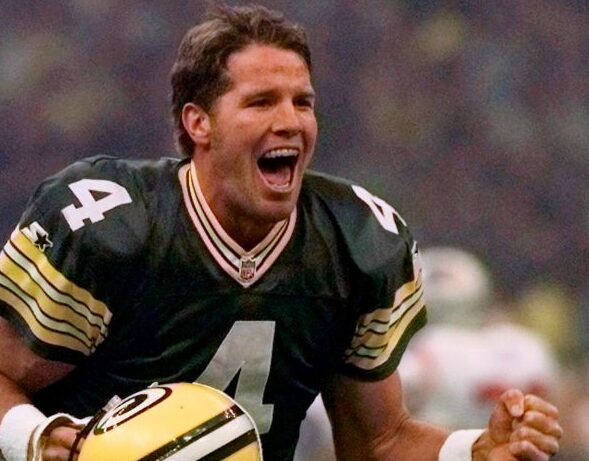Green Bay, WI – The echoes of Brett Favre’s legendary throws once filled stadiums, hearts racing as the famed quarterback led the Green Bay Packers to Super Bowl victory. Favre was more than an NFL player—he was a symbol of grit, courage, and endurance, standing as the Iron Man of football, playing 299 consecutive games. But today, the legacy of the man who set records and earned three consecutive MVP titles is shadowed by accusations of fraud and the heavy weight of a Parkinson’s disease diagnosis.
A hero now finds himself facing a different kind of battle—one against illness and scandal, far removed from the football field that once made him a household name.
From Champion to Accused: The Mississippi Welfare Scandal
There was a time when Mississippi held Brett Favre high, a native son who overcame the odds, rising from the state’s small towns to the NFL’s grandest stage. But the 2022 welfare scandal has shaken that faith. What was once a name tied to victory and resilience is now entwined with allegations of fraud.
Mississippi, one of the poorest states in the country, has long struggled to provide for its neediest residents. The Temporary Assistance for Needy Families (TANF) program was designed to help families survive through hardship, yet millions of dollars from this program were allegedly funneled toward Favre’s personal projects. Among them, the construction of a volleyball arena at his beloved University of Southern Mississippi.
The accusations did not stop at this project. There were also reports of Favre’s ties to Prevacus, a company developing a concussion treatment pill for NFL players, raising further questions about his involvement in misdirected welfare funds.
Evidence Reveals a Darker Truth
Favre’s fall into scandal wasn’t sudden—it unraveled slowly, piece by piece. Text messages and emails, obtained through an investigation led by Mississippi Department of Human Services (MDHS), suggest Favre knew the origins of the money. One such message showed Favre asking, “If you were to pay me, is there any way the media can find out where it came from and how much?”
Though Favre has insisted he did not knowingly take welfare funds and returned $1.1 million for speaking engagements he never performed, the weight of the evidence lingers like a shadow. His attorneys argue that he repaid the money in good faith, unaware of its origin. Yet, in the eyes of many Mississippians, who have long struggled with systemic poverty, this scandal hits particularly hard.
The people of Mississippi trusted Favre. He was their champion—until he wasn’t.
A New Battle: Parkinson’s Diagnosis
As the allegations swirl, Favre faces another challenge: Parkinson’s disease. Once unshakable on the football field, now even the smallest moments of movement come with difficulty. Parkinson’s—an illness that strips away control, affects speech, and makes daily life unpredictable—is a far cry from the stadium lights that once shone on his triumphs.
This diagnosis, coming after years of physical punishment on the field, is a reminder that even legends are not immune to life’s cruelties. Favre’s once-strong hands, capable of throwing pinpoint passes, now tremble with uncertainty.
A Legacy in Question
Brett Favre’s football legacy is undeniable. 508 career touchdowns, three NFL MVP awards, and a spot in the Hall of Fame are just pieces of his illustrious career. He was once a man whose very presence brought hope, not just to Green Bay, but to the people of Mississippi.
But the welfare scandal and his subsequent diagnosis raise questions about what his legacy will ultimately become. For every record set, there’s now a growing chorus of disappointment and disbelief. Mississippi, a state that revered him, now sees him as part of a scheme that robbed from the poor to fund personal projects.
Will Favre clear his name in court? Can he reclaim the admiration of his fans? Or will his story, much like the long-fought football games of his past, end in a loss that no one could have anticipated?
An Unfinished Story
Brett Favre’s journey has always been one of resilience, from overcoming addiction and injuries to breaking records no one thought possible. But this chapter of his life feels different. The fight against Parkinson’s is one that will be fought not in stadiums, but in quiet moments, away from the public eye. And the fraud case? It remains unresolved, hanging like a question mark over his once-glorious name.
For the people of Mississippi, who once held him as a symbol of hope, there is a bittersweet sense that the man who was once their hero might never fully return to grace.
Favre may still find redemption, but the path is unclear. As his body battles illness, his reputation battles the slow, steady creep of scandal.


